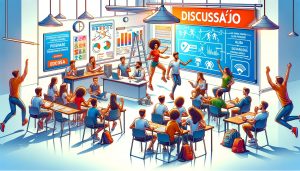
Introduction
Collaborative learning has always been a topic of interest to me, despite having yet to learn much about it. It had more to do with what I was trying to achieve regarding students learning about research and acquiring the skills that proved too challenging to grasp.
Having gone through an education system mainly based on lectures and theoretical content, I have always felt I needed more experience and tools acquired through practice.
Therefore, the scenario presented to us was thought-provoking, as it challenged the traditional notion of collaboration as merely a means of distributing workload.
Personal Experiences
In my experience as a teacher, I have always strived to foster collaboration among students. I recall guiding students through various phases of research projects designed to encourage collaborative learning as they learned or perfected multiple skills. The journey was filled with both successes and challenges. Successes were evident when students engaged in meaningful discussions, shared ideas, learned from each other, and produced reports and poster presentations at the end of the course. However, the challenges were equally prominent. One of the significant difficulties I faced was encouraging students to interact more and discuss instead of just dividing the sections among themselves. Some students preferred working individually, while others needed help contributing effectively to the group work.
Group Discussion
Our group had a rich discussion about our experiences, or lack thereof, in implementing collaborative learning. It was interesting to note the similarities and differences in our experiences. Some of us had similar challenges, while others brought unique perspectives that broadened my understanding of collaborative learning. These two weeks were a living experience of collaborative learning, with lots of digging, questions, and many more perspectives that sometimes confused us.
Learning from the Scenario and Research
Reflecting on the scenario in light of these discussions, my personal experiences, and recent research findings, I have gained a deeper understanding of collaborative learning and its complexity. It is not just about dividing tasks compiled in some product but about building a learning community where everyone contributes to and learns from the process. It’s about influencing students’ capacity for collaboration beyond the course. Recent studies have shown that collaborative learning and the need for cognition significantly predict learning satisfaction (Cheng et al., 2021). Students with an ‘understanding’ orientation tend to engage more often in face-to-face and online modes. These findings resonate with my experiences and provide a research-backed perspective on collaborative learning.
Future Implications
This reflection has reinforced my belief in the importance of collaborative learning and has given me insights into implementing it in my future teaching practices. I am now more committed to creating learning opportunities that encourage students to work together and help them recognize the value of becoming part of a learning community. The topic, sources provided, sessions, and discussions opened many more perspectives and possible strategies and solutions for my future teaching.
In conclusion, this reflective exercise has been valuable in my professional development. It has deepened my understanding of collaborative learning and highlighted the importance of reflection in enhancing teaching practices.

